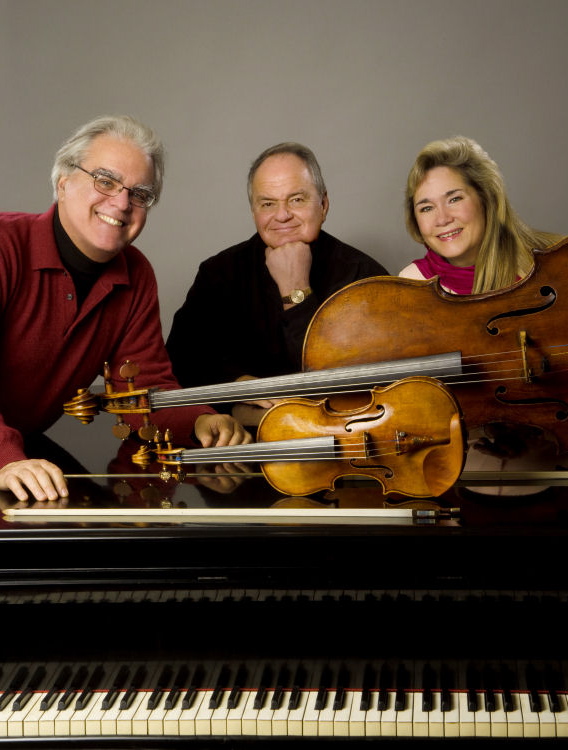KLR Trio offers impassioned performances

The Kalichstein Laredo Robinson Trio performed works of Beethoven, Previn and Tchaikovsky Wednesday night for Friends of Chamber Music.
Not many ensembles can be introduced with a simple “I figure you know who they are.” As the Kalichstein Laredo Robinson Trio took the stage Wednesday night at Gusman Hall for Friends of Chamber Music, the warm reception from the full house made clear that no other introduction was necessary. Pianist Joseph Kalichstein, violinist Jaime Laredo, and cellist Sharon Robinson bring together 36 years of integral experience, imbuing their performances with subtle taste, and Wednesday’s program of Beethoven, André Previn and Tchaikovsky was no exception.
Ludwig van Beethoven’s Piano Trio Op. 1, no. 2 was part of a set of three trios comprising his debut publication. They feature piano prominently within Classical-era confines, reflecting a young pianist seeking to establish himself in Vienna. Kalichstein’s pearly tone and impeccably clean ornamentation led the sound, with unselfish support from his colleagues. Sublime piano lines and luminous strings elevated the Largo con espressione beyond tender simplicity into reverence. When the strings finally took the spotlight in the last movement, they unleashed both flash and substance.
André Previn’s Trio No. 2, written for KLR last year, enjoyed a superb Florida premiere. KLR expertly carved out the dramatic opening movement’s post-Romantic counterpoint in strings, answered by sweet consonances in the jazzy accompaniment. The second movement features solo lines for each member, capably rendered. But the outstanding clarity of each musician’s contributions in the schizophrenic scherzo’s mix of jagged syncopation and lyricism was revelatory. Such excellent interpretation may well establish the work in the regular repertoire.
Pyotr Ilyich Tchaikovsky famously wrote in a letter to his patroness in 1880 that he didn’t believe that the timbres of violin, cello, and piano blended well, claiming that it was “absolute torture” for him to listen to any kind of trio or sonata for piano and strings. Nevertheless, when his friend, the great pianist Nikolai Rubinstein died in 1882, he was moved to compose his only trio in memoriam.
The Piano Trio is in two movements. The first, Pezzo elegiac, contrasts a stirring, plaintive theme in minor with heroic melodies, and a violin cadenza centerpiece brilliantly delivered by Laredo. From the heady, full-on Romantic opening, KLR’s emotional reading defined a noble struggle defeated by a funeral march.
The second movement is an extended Theme and Variations on folk music Tchaikovsky and Rubinstein once heard together, with each of the 12 variations representing some aspect of Rubinstein’s life. While the trio places impressive demands upon each member of the ensemble, it is arguably Tchaikovsky’s most difficult piano score. Kalichstein navigated the extremes of contrasts effortlessly, shining in a charming, martial third variation, grand Russian power chords in the seventh, and a spot-on Mazurka in the tenth. Laredo’s singing pathos in the fourth variation was matched by Robinson’s cantabile countermelodies, and a massive fugue in the eighth variation showed KLR’s uncanny voicing skill, ensuring no detail was lost.
The huge sound and fireworks of the closing variations, with its grand resurrection of the elegy theme in string octaves over big, Tchaikovsky piano, brought a cathartic end to the program.
Posted in Performances
Leave a Comment
Thu Jan 10, 2013
at 12:46 pm
No Comments